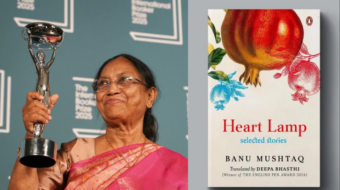May 2004 might be a watershed for contemporary Indian history. The Indian electorate marched into the voting booth and ejected the coalition government led by the right-wing Bharatiya Janata Party (BJP).
In its eight years in power, the BJP and its allies sold India’s assets to the lowest bidder. It allowed itself to be bribed into Enron-type contracts. In 1998, the BJP-government even created a Ministry of Disinvestments, whose singular mission was to sell off the public sector. Since an anti-colonial freedom movement that emphasized economic self-sufficiency has shaped India’s political culture, the BJP’s actions would ordinarily have been considered treasonous.
The BJP hid its “disinvestments” with its campaign to assert the will of the “Hindu” as against Muslims, oppressed castes, women and progressives of all shades. Pogroms against Muslims, tough talk against “terrorism,” an alliance with Israel, and other such moves provided the BJP with a convenient way to get its neoliberal scandals off the front page. Hundred of farmers committed suicide in the state of Andhra Pradesh because they could not afford the basic agricultural inputs, but this sad fact disappeared from the newspapers. Instead, the papers offered pompous and racist commentaries on Muslims (whom they accused of being “terrorists” and “anti-national”).
The BJP-led government’s record in office is dismal as far as the working class is concerned. Between 1998, when the BJP came to power, and 2002, more than 800,000 workers in the organized sector lost their jobs. About 650,000 are in the state sector. Many of these workers have now moved from union jobs with decent salaries and benefits to the low-end, unorganized sector where there are no benefits, and where the perils of life without regulation means that the wages are abysmal. The government’s own statistics show that while agricultural output has remained steady, the growth rate of agricultural work is 0.13 percent. Unemployment in rural areas is rampant.
At the same time, the government slashed the food security program, which had been place for five decades. The government used to buy surplus food grains at a fixed (but still very low) price to stabilize the market. Then it would sell these foodstuffs in “fair price shops” so as to ensure that the population would have access to nutrition. However, pushed by the World Bank and the IMF, the BJP-led coalition began to undermine food security. Between 1995 and 2001, the number of undernourished people in India increased by 20 million. The UN’s Food and Agriculture Organization’s “State of Food Insecurity in the World” report of 2003 shows that of the 842 million undernourished people in the world, 214 million, or a full quarter, live in India.
Farmers lost control of water resources, now being privatized to big corporations like Coke and Vivendi. While Enron’s power earned it a massive, guaranteed profit in India, farmers could not access electricity to run their machines at a reasonable rate. Power rates in the BJP period tripled in rural areas, while fertilizer rates rose out of the reach of small farmers. The government provided little credit to tide over farmers, as rural credit fell in the past decade. In 1992, agricultural credit made up almost 20 percent of the total credit offered by government financial institutions. A decade later, the rate dropped to just above 10 percent. The government began to talk about “credit cards” for farmers – a ridiculous proposal by a government quite out of touch with the realities of India.
None of this made any impact on the BJP, which claimed that India was “shining.” The electorate turned them away.
Prime Minister Manmohan Singh of the Congress Party leads the new coalition government. In 1991, Singh was the finance minister who fashioned the architecture for India’s structural adjustment. Nevertheless, Singh is a personally honest man, itself a feat in our current world. With their largest mandate ever, the left-wing parties have decided to work with the Congress Party from outside, to ensure that the communists have a voice on the national stage and a place to critique from without. If the Congress Party continues with the BJP line, it will be political suicide.
The author can be reached at pww@pww.org.










